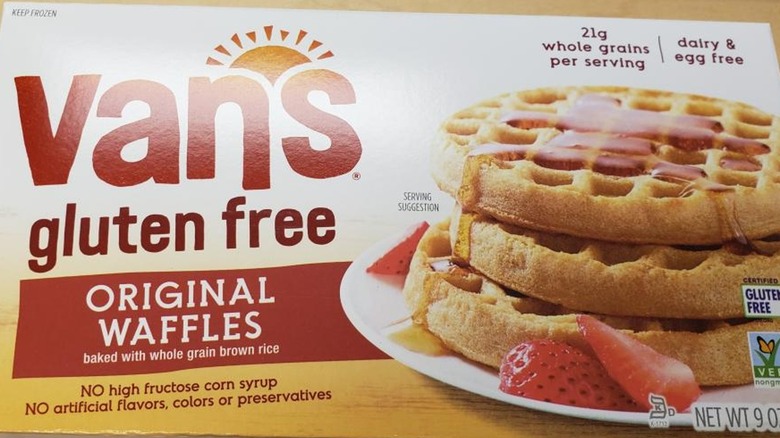Van's Gluten-Free Original Waffles Are Being Recalled Due To Undeclared Wheat
As reported by the U.S. Food and Drug Administration, Van's International Foods (also known as Van's) has initiated a voluntary recall of its Gluten Free Original Waffles. Some products within a certain lot may actually contain wheat due to a mix-up between the company's gluten-free and wheat-containing products. As a result, consumers with a wheat allergy or intolerance are urged to check their pantries to determine whether they have purchased the affected products.
The product in question can be identified by a best buy date of 1/19/2024 and a lot code of #UW40193L, which can be found on the side of the packaging. Consumers can also follow up with retailers for more information on lot codes. Fortunately, no one has experienced an allergic reaction or adverse effects as a result of Van's waffles. Additionally, this is the only product impacted by the recall and it's believed that only a certain number of gluten-free waffles are actually affected.
What consumers should know about the possible impact of gluten
According to the Cleveland Clinic, gluten intolerance can lead to symptoms like bloating and nausea when eating foods containing gluten, which is found in wheat and other types of grains. While uncomfortable, gluten intolerances are not quite as severe as gluten allergies, which can lead to more serious symptoms like skin itchiness and shortness of breath. When gluten allergies are severe, eating just a small amount of gluten-containing food can lead to a medical emergency.
In most cases, people with gluten intolerances and allergies can avoid issues by abstaining from certain food. This highlights the importance of accurate product packaging, which allows consumers to make smart decisions regarding their health and wellness. Per the FDA, certain items must be listed on food labels, including eight major allergens, including fish, peanuts, soybeans, wheat, eggs, milk, crustacean shellfish, and tree nuts. While food manufacturers do their best to create accurate product labels, mistakes can still occur. Fortunately, enacting a voluntary recall can protect consumers from experiencing substantial health issues.

